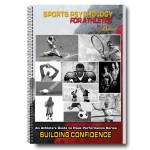“Perfection is impossibility but striving for perfection is not. Do the best you can. That is what counts”— John Wooden
 Is perfectionism in basketball is a highly desirable trait that ensures high standards and utter reliability—or a mental game handicap of dithering, delay, and delusions?
Is perfectionism in basketball is a highly desirable trait that ensures high standards and utter reliability—or a mental game handicap of dithering, delay, and delusions?
Is it a healthy drive or self-destructive?
According to sports psychologist for basketball, perfectionists value and foster excellence and strive to meet important goals.
In certain areas, like sports and science, perfectionism is not just tolerated but encouraged. To some, perfectionism is about high standards, persistence, and conscientiousness.
Perfectionists are organized. They have self-imposed high standards, and in the role of parent, teacher, or mentor, they tend to impose those standards on others. Combined with ability and stability, perfectionists can, should, and do, reach their ultimate level of performance.
But there is a dark side: Perfectionism is seen as a cause and correlate of serious psychopathology. At worst, perfectionists believe they should be perfect—no hesitations, deviations, or inconsistencies. They are super-sensitive to imperfection, failing, and weakness. They believe their acceptance and lovability is a function of never making mistakes. And they don’t know the meaning of “good enough.” For them, it’s always all or nothing.
Sports psychologist see perfectionism almost always as a handicap. They see perfectionists as vulnerable to distress, often haunted by a chronic sense of failure; indecisiveness and its close companion procrastination; and shame.
So where does perfectionism in young athletes come from?
Parents, of course. As always. They may have been critical and demanding. Perfectionists in adulthood live with their parents’ voice, and their standards.
The way sports psychologist measure perfectionism probably best explains how they conceive of it:
• One issue is concern over mistakes, which reflects negative reactions to mistakes; a tendency to interpret mistakes as equivalent to failure; and a tendency to believe that you will lose the respect of others following failure.
• A second issue is of personal standards, which reflect the setting of very high standards and the importance placed on these high standards for self-evaluation.
• The tendency to believe that one’s parents set very high goals comprises the third issue.
• Fourth, the perception that one’s parents are (or were) overly critical constitutes the parental criticism element.
• Another feature is the doubting of actions, which reflects the extent to which athlete doubt their ability to accomplish assigned tasks.
There is nothing wrong with setting high standards, but they need to be reachable with effort. It’s all about being among the best, if not the best.
In order to get rid of perfectionism you must build-confidence and deal with your feelings of inferiority.
It is far easier to find self-confidence if you strive for “excellence” rather than perfection.
Excellence is attainable. You can see it, hear it, and feel it around you all the time. When you strive for excellence, rather than perfection, you can begin to realize that it’s good to have high goals and achieving them is less stressful, more filling and fun.
To build your confidence you must change the way you think. A 100% of the time it is 90% mental.
Confidence is a mind-set skill that doesn’t just happen by chance. You must work at it.
To build your confidence, specific strategies are required. These strategies can be found in my workbook – An Athlete’s Guide to Peak Performance Series– Building Confidence
Go to www.sportspsychologybasketbsall.com. Click products and get started on Building Your Confidence with Sports Performance Top Mental Game Coach.
